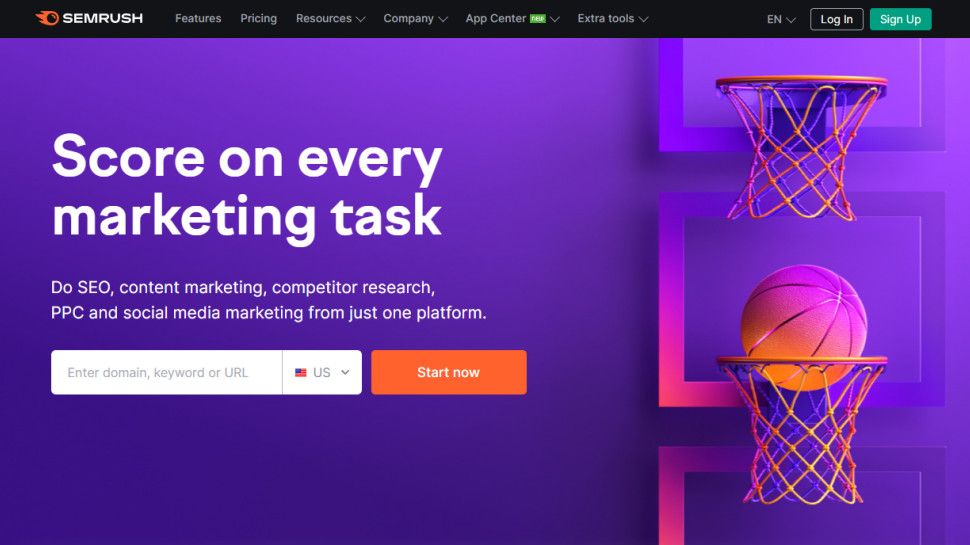SemRush was launched in 2008 by a group of IT and SEO specialists to make the digital competition fair and transparent. And, today it is one of the most popular and powerful platforms used by marketers to grow their website’s traffic and keep up with the SEO industry. It offers a wide range of features, including keyword research, competitive analysis, site audit, on-page SEO checker, and many more. In fact, we’re also huge fans of Semrush, thanks to their detailed insights and comprehensive toolset. In this detailed review, we’ll cover Semrush’s core features, pricing plans, use cases, and much more. So, let’s get started with it right away.
SemRush: Plans and pricing
(Image credit: SemRush)
SemRush caters to a wide range of digital marketing needs through its structured plans, from beginners to large enterprises. Below are the details of their plans, features, and pricing. The Pro Plan is $129.95 per month and is ideal for newbies and small teams. With this plan, you can manage up to 5 projects, and track up to 500 keywords. You also get 10,000 results per report. Other features include comprehensive SEO, PPC, and research tools, including competitor analysis, keyword research, website audit, backlink analysis, and advertising tools.
Next up, is the Guru Plan which starts from $249.95 per month and is ideal for agencies and mid-sized businesses. Key features include all Pro features and some additional tools like Content Marketing Toolkit, historical data access, multi-location and device tracking, and Looker Studio integration. You can also manage up to 15 projects, track up to 1,500 keywords, and 30,000 results per report.
The third plan is best for large agencies and enterprises and the plan starts from $499.95 per month. The Business plan includes all the features of the Guru plan plus some exclusive benefits like share of voice metrics, extended limits, API access, PLA analytics, and free migration from third-party tools. With this plan, you can manage up to 40 projects, and track up to 5,000 keywords, and 50,000 results per report.
SemRush: Features

(Image credit: SemRush)
SemRush does in-depth keyword research and offers tons of details, including search volumes that often stretch into millions for high-traffic terms, user intent classifications (informational, commercial, navigational, transactional), and competitive density scores on a scale from 0 to 1.0. This is crucial to tweak your SEO strategy to match your audience’s behavior precisely.
Plus, its competitive analysis doesn’t just skim the surface but goes deep. By analyzing your competitors’ organic search metrics, SemRush finds out not just the keywords they’re ranking for but also delivers a visibility score that reflects their prominence on SERPs. This is instrumental in identifying not just any keywords but the right ones that can improve your SERP positioning.
The tool’s keyword magic feature is also pretty impressive, as it offers over two million keyword ideas from a single seed keyword. This vast pool of suggestions opens up avenues for content strategy expansion and reveals less obvious yet potentially lucrative keyword opportunities.
We also love SemRush’s Gap analysis feature which takes a comparative approach and directly contrasts your keyword profile with up to five competitors. It’s not merely about volume but it dives into keyword difficulty scores and SERP features occupied by competitors. This comparison explains strategic gaps in your SEO approach and offers a roadmap to prioritize efforts on keywords where you can realistically outperform your rivals.
Moreover, if you’re looking for “not provided” keywords, SemRush also integrates with Google Analytics and Google Search Console to bring such keywords to light and present a complete picture of your organic search landscape. This integration is super-friendly for bridging the gap between estimated search data and actual visitor behavior on your site.
Again, SemRush is designed to help you out with extensive tasks. For this, you get to manage and segment up to 2,000 keywords under the Keyword Manager. This feature is particularly useful for large-scale campaigns or agencies managing multiple clients.
Content Optimization Tools

(Image credit: Semrush)
SemRush content optimization tools analyze and provide recommendations on keyword usage to make your content more SEO-friendly. They not only identify which keywords to use but also mention the number of times to use them. This is guided by insights acquired from your competitor’s performance.
Plus, you can integrate Semrush into your Google Docs, WordPress, and even MS Word account. It offers extensive writing assistant tools that use AI to brief you on important metrics about your content, including its formatting, SEO optimization, tips to improve readability, and many more. They do this by evaluating your content for factors like sentence length, complexity, and overall structure and offering suggestions to enhance readability. This is crucial, as accessible content tends to perform better in terms of user engagement and search engine rankings. The best part? You get all this live along with your writing tools. This saves a lot of your time during editing and improves your content significantly. And, if you use a separate tool for plagiarism checking, SemRush will also solve that issue, as it has its own originality checker. The tool scans a vast database, flagging potential duplicates so you can maintain the uniqueness of your content, which is critical for ranking purposes.

(Image credit: Semrush)
SemRush’s PPC Keyword Research Tools present highly searched terms to niche long-tail keywords, with volumes varying from a few searches per month to several thousand. This information helps you identify both high-traffic and low-competition opportunities.
Cost-per-click (CPC) analysis is another area where these tools deliver extensive data. CPC values can range from as low as $0.05 in less competitive niches to over $50 for highly competitive terms. This insight helps you make informed decisions on budget allocation and bidding strategies.
We’re also big fans of Semrush’s competitive analysis feature, which points out rivals’ strategies and reveals opportunities for optimization and outperforming competitors. This insight includes data on competitors’ ad spend, the keywords they are bidding on, and their past ad performance. By gaining this information, you can identify gaps in their strategy and take an upper hand.
Lastly, you also gain access to localized data with Semrush. This helps you improve the relevance of ads in specific demographics and regions to increase your engagement rates and the overall efficiency of PPC campaigns.
On-Page and Technical SEO

(Image credit: Semrush)
Semrush’s Site Audit tool is designed to crawl websites in detail by simulating search engine crawling behaviors. While doing this, it pinpoints and prioritizes on-site issues, covering more than 130 checks for SEO health, including HTTPS security protocols, core web vitals, and issues like duplicate content.
Among the On-Page and Technical SEO tools, the On-Page SEO Checker is our favorite, as it goes beyond keyword optimization. Utilizing Semrush’s extensive dataset, it provides tailored recommendations by analyzing SERP positions, backlink profiles, and content quality. Plus, it predicts how much traffic you might get and compares your site with competitors.
Also, if you face difficulty deciding what to include in your article, the SEO Content Template tool can be of great use to you. It generates content creation blueprints by analyzing top-performing pages for selected keywords. Moreover, It advises on text length, backlink sources, and multimedia inclusion tailored to Google’s SERP features preferences.
Link Building and Backlink Analysis

(Image credit: Semrush)
Semrush’s Backlink Analytics tool examines websites’ backlink profiles by identifying link-building patterns and pointing out opportunities for growth. It does this by separating links by type, attributes, and quality. Besides this, it also tracks how backlink profiles change over time to understand patterns on how these links are won.
We all know how harmful backlinks can affect SEO health. Keeping that in mind, SemRush also offers a Backlink Audit feature that identifies potentially harmful backlinks. This process involves integrating with Google Search Console to evaluate link quality using over 45 different toxic markers. With this, you can easily manage and reject harmful links directly on the platform.
Its link-building tools further help to simplify your outreach process. It suggests potential link-building opportunities based on competitor backlink profiles and keyword priorities. We also love how Semrush manages outreach campaigns and evaluates the authority and relevance of suggested sites. Also, the way it organizes prospects by campaign for the efficient execution of targeted link-building strategies greatly streamlines the process.
SemRush: Interface and in-use
SemRush’s interface is user-friendly and effective, so whether you’re a beginner or an experienced digital marketer, you won’t have issues navigating its extensive toolset. The dashboard is also neatly organized, so you have tools for SEO, PPC, and content marketing at your fingertips. What we love the most about this setup is the ease with which we can switch between tasks.
Though the platform’s broad range of features might initially confuse a beginner, this variety showcases SemRush’s strength as a vast digital marketing tool. Overall, SemRush offers a mix of complexity and user-friendliness and delivers a powerful resource for diverse digital marketing activities.
SemRush: Support

(Image credit: SEMRush)
SemRush offers multiple support options to help you fully utilize its capabilities. If you’re new to the platform or want to improve your understanding of its features, you can schedule a session with an expert. These experts walk you through the platform and demonstrate how to make the most of its extensive features.
For those considering an upgrade or needing a solution for their specific requirements, the sales team is always available to assist and guide you through the different options to find the perfect fit for your needs.
SemRush also caters to users who prefer to explore and learn independently. It offers many self-help resources, including user manuals, instructional videos, and FAQs. These materials are designed to help users navigate the platform and address any questions they may have.
SemRush: The competition
SEMRush is broadly aligned with competing SEO services in terms of both pricing and the feature set. For example, Moz Pro, one of its top competitors, has roughly comparable subscriptions (although a lower entry tier) at the price points of $99, $179, $249, and $599 per month, with each upgrade adding higher limits and new features.
Also, keep in mind that some platforms have more affordable plans than either SEMRush or Moz Pro. For those who don’t need everything included in the Pro subscription, or if $120 per month is over your budget, then consider a service with a lower barrier to entry.
SemRush: Final verdict
If you’re looking for an SEO tool to enhance your website’s SEO, PPC, and content strategies, SemRush is probably among the top options. While we did face a learning curve to use its comprehensive features, its interface is remarkably user-friendly. We appreciate the supportive resources and expert guidance SemRush provided, as it helps maximize the investment.
The plans offered by SemRush are also designed to accommodate the needs of all businesses, whether a small team or an enterprise. Despite the plans being costly, the substantial value SemRush adds to online marketing efforts justifies the price, making it an excellent investment if you’re looking to boost your website.





